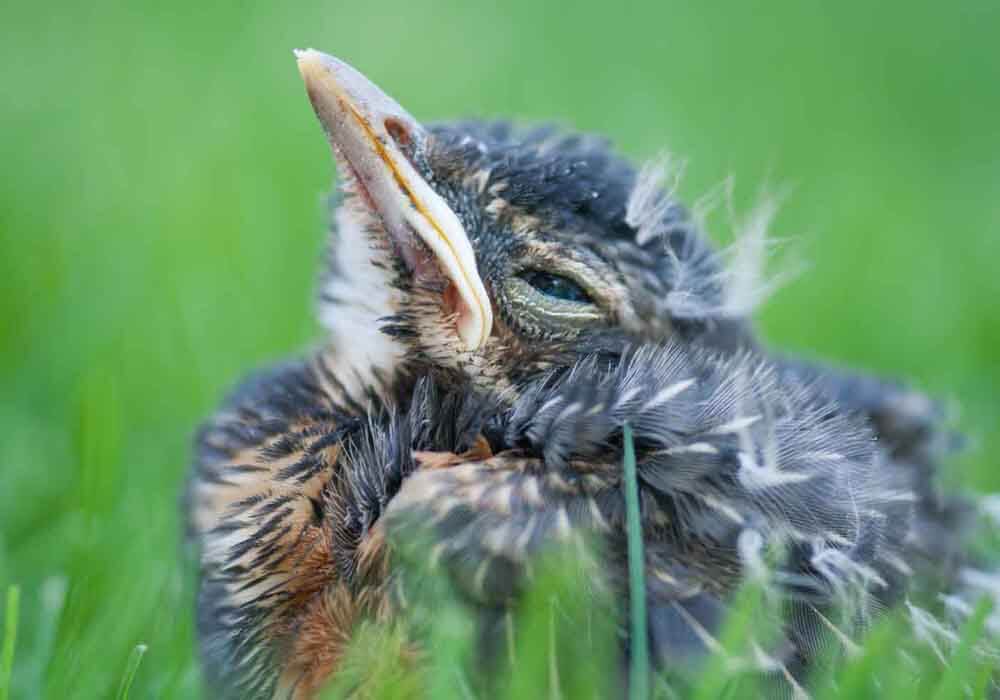How To Care For A Baby Bird
How to care for a baby bird isn’t overly hard if you have the proper knowledge, the uncertain part is whether they’ll survive this early life stage because they’re so vulnerable.
You can care for a baby bird by providing the right environment for its age requirements. It would be best to learn how to hand-feed it correctly, what to feed it, and how often to feed it. You must focus on these aspects of a bird’s life to ensure it’s healthy and happy.
In the rest of this article, I’ll discuss the different ways to care for a baby bird, from what you should feed it to how to do it correctly. By the end, you’ll know how to take care of your new friend and ensure it has a long and happy life.

Where To Keep a Baby Bird
The best place for a hatchling without feathers is in its nest. The chances of survival at this vulnerable age are slim—so exhaust every avenue in renesting the baby bird. Always consider that the parent birds may return first before interfering with nature.
If you have exhausted every avenue of reuniting the baby and its parents—it would be best to provide your nestling with the following:
- A brooder provides the best environment for hatchlings—or you may use a cardboard box with a heat mat or lamp—in a pinch.
- MaIntain temperatures of between 95°-97°F (35°-36°C) if your baby bird has not developed feathers.
- Provide flooring with proper grip to prevent leg splaying, such as hand towels or paper towels.
- Prevent any exposure to drafts or temperature fluctuations
- Clean your brooder lining often.
- Keep your baby bird in a quiet area with minimal noise.
What To Feed a Baby Bird
Baby birds eat the same foods their parents eat. Therefore, you must consider this fact when deciding what to feed the chick and provide nutrition similar to its natural diet. Although wild birds have different diets, you can feed them several foods for emergency purposes.
Finally, it’s worth noting that chicks have different nutritional needs than adult birds. The diet you give them must provide the following:
- Energy for growth and development.
- Provide the chick with the correct protein, fat, and carbohydrate ratio.
- Essential vitamins and minerals.
The type of food you give your baby bird will depend on its species. Some common foods safe for most birds include:
- Cooked rice
- Moist dog food
- Raw liver
- Hard-boiled eggs
- Moistened dog biscuits
- Moistened cat or dog kibble
You should avoid feeding your baby bird the following:
- Milk
- Pet bird food
- Worms
- Kitchen scraps
- Whole birdseed
- Bread and its products
These foods are unhealthy and unsafe for baby birds. Bread, for example, can swell up in a bird’s stomach and cause health problems.
How To Feed a Baby Bird
If you’re a parent raising a baby bird, hand-feeding is the only option to feed it. Although you can remove the chick from its parent before weaning, VCA Animal Hospitals suggests waiting up to three weeks.
Hand-feeding a baby bird is not a walk in the park. It needs commitment, patience, and time. Thus, it’s best to contact an experienced bird breeder or aviculturist to help you.
It’s worth noting that most birds soften the food by eating it themselves and then regurgitating it to their young ones. You can do the same by mashing up the food or soaking it in water until it’s soft enough for the baby bird to eat.
The following is a guide to hand-feed your baby bird correctly:
Develop a Feeding Schedule
Baby birds have demanding nutritional needs. The high care a baby bird demands—explains why adult birds make countless feeding trips daily.
These feeding demands require you to have a schedule. The best way to do this is to feed the bird every 15 to 20 minutes daily. Your feeding program should run from sunrise to sunset.
You should reduce the feedings gradually as the baby bird matures. For instance, reduce the feeding to hourly once you notice that the bird can leave the nest and hop around the box.
Assemble Your Feeding Kit
You need the following items to hand-feed your baby bird:
- A soft, clean cloth or paper towel to catch any spillage.
- A tweezer or chopstick to place the food in the bird’s mouth (if older).
- A small syringe or eyedropper to measure and deliver the food (if younger).
- The chick formula or baby bird food.
- A bowl to mix the food.
- Clean water for mixing the food and cleaning up.
Decide on What To Feed the Baby Bird
The first question you need to ask yourself when learning how to care for a baby bird is: What is the diet of the particular hatchling that you rescued?
Birds fall into three categories, each of which has its own nutritional needs:
- Herbivorous (seeds, nuts, fruit eaters)
- Carnivorous (insects, meat)
- Omnivorous (both insects and seeds, nuts, fruit)
When deciding what to feed your baby bird, the focus should be on food that provides the required nutrients. In most cases, carnivorous baby birds need more protein-rich foods for proper growth and development.
Before caring for a baby bird yourself, consider taking the bird to your local wildlife or bird shelter. Barring that, seek advice on the precise care needs of your specific adopted bird baby.
Here are some suggested formulas for baby birds, but always consult professionals before creating your bird’s diet!
|
Bird Type |
Omnivore |
Herbivore |
Carnivore |
|
Examples of Type |
Sparrows, thrush, |
Finch, dove, quail |
Shrikes, falcons |
|
XX |
jays |
parrots |
owls, eagles |
|
Best food |
Milk in bran, milk |
Baby parrot |
Pureed meat, |
Expert Tip #1 Baby birds may reject their formula if it is too cold, so ensure you gently heat the feed mix to between 102°-106°F (39°-41°C)
The process of hand-feeding a baby bird usually starts with mixing the formula. However, you can opt for commercially-prepared and veterinarian-recommended diets.
You can then use a small, soft-tipped syringe or eyedropper to place the solution into the chick’s mouth. The chick should be able to control the amount of formula it ingests.
Expert Tip #2 You should moisten the food to attain a moist consistency for easy eating. It should not be saturated as the bird can drown in excess water.
This helpful video below is a guide on how to feed a baby bird:
Start Varying the Bird’s Diet
When learning how to care for a baby bird you should be mindful to give it more food options as it grows. The goal is to help the bird develop a healthy appetite for different foods.
You can, for instance, start by adding new items to the diet gradually while reducing the number of times you feed it daily. For example, you can add cooked rice and reduce the feeding frequency to thrice daily.
A key aspect to consider when varying the chick’s diet is to start introducing it to regular foods it will eat as an adult. Here is a simple guide to this:
- Insect-eating birds: Birds of this type eat insects like beetles, grasshoppers, and crickets. It would be best to chop small insects and then wean them to frozen-thawed insects.
- Fruit-eating birds: These include cedar waxwings and orioles. Start by giving them fresh fruits like grapes, oranges, and berries. You can then add canned fruits as they get bigger.
- Nectar-eating birds: These include hummingbirds and sunbirds. Start by giving them a sugar solution (one cup of sugar to four cups of water). You can add fruit juices and nectar mixes to the diet as they get bigger.
- Seed-eating birds: These are the most common pet birds. You should, therefore, have an easy time finding their food. Start by giving them crushed seeds. You can then add whole grains to the diet as they get bigger.
Expert Tip #3 Avoid giving your bird these poisonous substances:
- Avocados
- Chocolate
- Caffeine
- Alcohol
How Often To Feed a Baby Bird
As earlier mentioned, baby birds have demanding feeding needs that you need to fulfill. According to VCA Animal Hospitals, baby birds with closed eyes need five to six feedings daily. On the other hand, those whose eyes have opened need three to five feeding sessions.
As your birds develop feathers, you should reduce the feeding to two to three times daily.
The weaning process is complete when the birds start feeding themselves and no longer rely on you for food. Depending on the bird species, this stage should happen between 10 and 25 weeks.
How To Know if Something Is Wrong With Your Baby Bird
Like human babies, baby birds are vulnerable and prone to experience health issues. In case of any such problems, you need to consult a veterinarian immediately.
Some symptoms to watch for include:
- Excessive fussing
- Lack of sleep
- Loss of appetite
- Poor weight gain
- Excessive sleeping
- Vomiting
- Diarrhea
- Breathing difficulties
- Fluffed-up feathers in birds that are not preening themselves
- lethargic
- Closed eyes

Chances are when you found your baby bird it had fallen out of a nest or is in a nest with other eggs. Here's a couple of articles of ours that you'll find of interest...
- Will Bird Eggs Hatch If They Are Abandoned?
- Will Birds Reject Eggs That Are Touched By Humans?
- Do Birds Abandon Their Babies?
How To Care For A Baby Bird...Final Thoughts
Caring for a baby bird is a demanding but rewarding process. The key to success is being patient and following the steps mentioned above. Doing so will help you raise a healthy and happy bird.
You should also consult a veterinarian in case of sickness symptoms such as lethargy and loss of appetite.
Back To The TOP Of This How To Care For A Baby Bird Page

About the Author...
Richard Worden, a dedicated bird lover for over 20 years, I love to share my in-depth knowledge and passion for birds. Read more About Me and my expertise in this field.
- We Know Birds HOME ›
- Bird Health and Care Information ›
- How To Care For A Baby Bird
